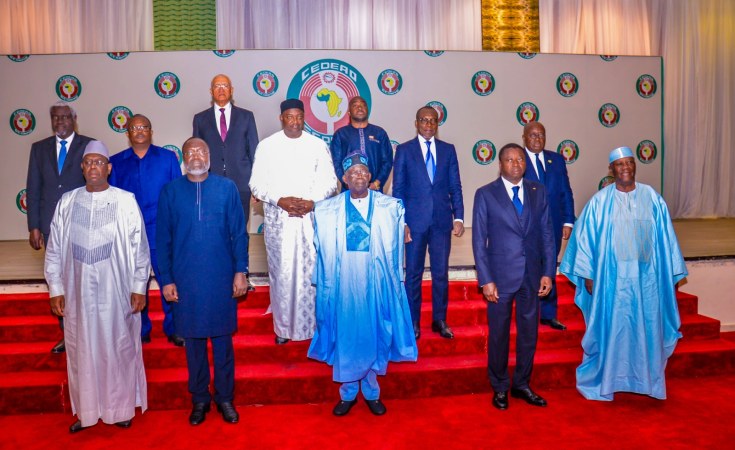After two days of uncertainty, the leaders of the coup have chosen General Omar Tchiani to be Niger's new strongman. However, their plans for the country remain unclear.
There was initially a power vacuum in the Sahel after the leaders of the uprising in Niger read out their declaration that President Mohamed Bazoum had been deposed on Wednesday. The soldiers left the public in the dark as to whom they had chosen to lead the country. It apparently took two days of internal wrangling for them to reach a decision.
It wasn't until midday on Friday that General Abdourahmane Tchiani, who goes by the name Omar, appeared on state television with the title "president of the National Council for the Safeguard of the Fatherland." Tchiani, the long-standing head of the presidential guard, was reportedly involved in an unsuccessful coup attempt shortly before the democratic transfer of power in 2021.
Observers believe that other senior generals had also sensed an opportunity to seize power. Prior to Tchiani's appearance on TV, DW correspondent Gazali Abdou reported a degree of anxiety in Niger's capital, Niamey: "If, after a few days, they can't agree on the leadership, there's a risk that the situation among them will escalate." It remains to be seen whether Tchiani will now stabilize things as the new and undisputed ruler.
Security 'extremely worrying'
One key question about the coup is what has motivated its leaders. Daniel Kere is the executive director of the association Cercle d'Etudes Afriques-Mondes in neighboring Burkina Faso, a country that experienced two coups in 2022. Kere told DW that the demands that Niger's insurgents made shortly after the coup on Wednesday were not clear.
"The political situation there is not nearly as threatening as in other countries," Kere said. "Even the challenge to imperialism was not in fact sufficiently developed in Niger to justify this coup. And, if we analyze the coup plotters' explanation of their takeover, we don't see any fundamental motive that could justify this takeover."
In his televised statement, Tchiani repeated that the coup was motivated by the "ongoing deterioration of the security situation."
Close observers of Niger disagree with that statement. "Compared to 2021 and 2022, we can say that 2023 is one of the best years in terms of security policy," the political analyst Alkassoum Abdourahmane told DW. "This spurious argument, as used in other Sahelian countries in relation to coups d'etat, is, I believe, inadequate in the case of Niger."
The security researcher Moussa Zangarou also told DW that the situation had improved so far in 2023. However, he said, 12 people were killed last week in various places in the triborder region with Mali and Burkina Faso. "So the security situation is extremely worrying," Zangarou said. "Whoever comes to power will ultimately fail if they don't take the security issue seriously."
Military governments are in power in both neighboring Mali and Burkina Faso following coups. And, while Kaou Abdrahamane Diallo, the party secretary of the junta-affiliated PACP in Mali, condemns the coup in Niger, he also told DW that there could be advantages to a military government in Niger. "Burkina Faso and Mali are already working hand in hand," he said, "and we can only hope that the new Nigerien rulers share our view of the situation, and that together we can overcome the challenge of terrorism."
EU's Sahel partner
Niger's EU allies do not share this optimism. They saw Bazoum as a reliable and, above all, democratically legitimate partner in the Sahel, especially after the coups in Mali and Burkina Faso. In 2022, France transferred its remaining soldiers from Mali to Niger. Germany is also organizing for Bundeswehr troops to withdraw from Mali by the end of this year, and had been collaborating on the establishment of a new training mission in Niger. These plans are now likely to be reassessed. Furthermore, France needs Niger as a supplier of uranium for its nuclear power plants.
After the coup, the French and German governments repeatedly positioned themselves on the side of Bazoum and called for the return of the constitutional order. It is notable that Russia, which was able significantly to expand its influence in the wake of the other coups, particularly in Mali, has also called for the constitutional order to be restored. The West African alliance ECOWAS, the AU and a number of African heads of state, as well as the US, have expressed similar views.
Remy Arsene Diousse, program manager at the Friedrich-Ebert-Stiftung Peace and Security Centre of Competence Sub-Saharan Africa in Dakar, told DW that such statements are a "warning to the coup leaders that the country will lose the benefits of cooperation if they persist." They would lose logistical support, intelligence exchange and strategic cooperation, he said: "This would have a serious negative impact."
Indeed, Josep Borrell, the EU's representative on foreign affairs and security policy, was quick to warn that the coup would have consequences for Niger's cooperation with the bloc, "including the immediate suspension of all budgetary assistance." ECOWAS states may also decide to impose sanctions on Sunday, as they did after the coups in Niger's neighbors.
The plotters seem willing to factor in a further deterioration of the economic situation, having said from the start that they would not tolerate foreign interference. The armed forces of Germany and other partners have also been affected by the closure of Nigerien airspace. It remains unclear whether Tchiani and his followers intend to break with the West entirely, as the junta in Mali did.
There does seem to be some support for this among the Nigerien population, if the burning of French flags at a rally in the capital, Niamey, is anything to go by. "The French army base must leave," one demonstrator told the AFP news agency: "We don't need the French to keep us safe."
Charles Bako, Gazali Abdou, Carole Assignon, Dirke Köpp and Mahamadou Kane contributed to this report.
The article has been translated from German.


